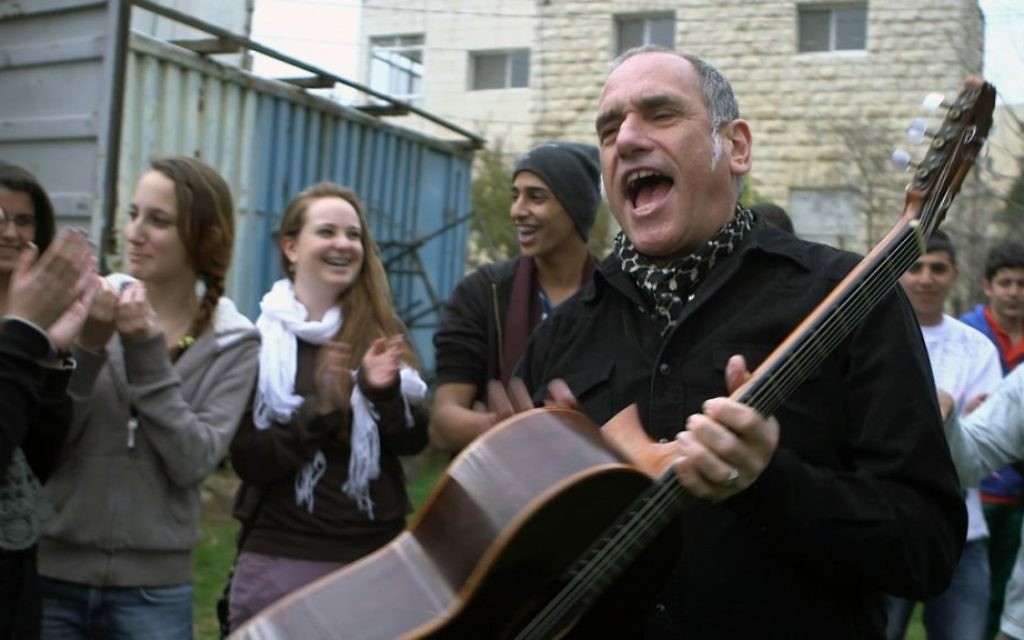Broza: ‘Jerusalem’ Film Puts Israelis in ‘Finest Light’
Iconic Israeli musician David Broza will appear Saturday night, Jan. 30, for two Atlanta Jewish Film Festival screenings of the documentary “East Jerusalem West Jerusalem,” about the making of his new album of the same name.
Ahead of his visit, he chatted with the AJT about his music and his motivation for producing a film about Israelis and Palestinians making peace through music.
—
Get The AJT Newsletter by email and never miss our top stories Free Sign Up
AJT: What was your inspiration for this film?
Broza: I was making an album called “East Jerusalem West Jerusalem,” and when I got everybody together to make the album happen, I came up with the idea to film it. So I hired a production company, and we shot over eight days and eight nights in Jerusalem.
AJT: It’s been over a year since the film was released. Have you seen any change in Jerusalem since then?
Broza: So, the film is still not distributed at large. We are on the festival circuit now through 2016, and wherever it has been, the reaction was phenomenal. It was way more than I expected. As it turns out, though, recent events in the Middle East haven’t been very positive, and things have escalated, so the film becomes all the more a ray of light.
AJT: Are you happy with the way Israelis were portrayed in this film?
Broza: If the film hadn’t shown what was going on outside the studio during the recording of the album, we would have been fools, and I’m no fool. I work in the worst possible conditions, and I try to shed a positive light on the good side of humanity. To not show what was going on in real time, are you really that afraid to expose the actual fact that there are a lot of wrongdoings in Israel and in Palestine, which makes this life very difficult for those who seek peace? Why would you be afraid to show it? Why hide it under the rug? Let’s face it, and let’s fix it. If anything, this film puts Israelis and Israel in the finest light of all.
AJT: You are one of the only Israeli musicians reaching across and working with Palestinian artists. Have you ever been worried that it would affect your popularity?
Broza: I don’t think it does because I don’t just work with Palestinians. I work with anyone who wants to play music. I don’t bring politics into my life, but my life as it is has a political aspect to it. When it comes to me working with the Palestinian settlements, they live in a reality that they are very much aware of, and they need to be shown that they are part of Israeli society.
AJT: This film begins and ends with some very shocking imagery of Israelis marching through the Arab quarter on Jerusalem Day. Do you think it was a fair representation of the situation?
Broza: First of all, I didn’t direct or edit this film, although I’m certainly the one who funded it. The director and editor were very right in showing the first minute and last minute as a troubled picture, and I think that those people who are walking through the Muslim Quarter on Jerusalem Day, if they would just sit and talk about it, they would come to their senses. You don’t have to call death on the Arabs like they did. It’s unacceptable.
AJT: Looking back on the finished film, would you make any changes to it?
Broza: I find faults in all my work; nothing is perfect. As far as the film goes, there are many ways to look at the picture. I had a completely different story in mind when I set out to make this film, but I have to live with the fact that I’m not directing or editing.
AJT: Let’s talk about the music. Did you really record the 14 tracks in only eight days?
Broza: Absolutely. The only reason I recorded it in eight days is because I told everyone a week, and they said I was crazy, so we added another day. Everything that you hear on the album is all live and done in one take.
AJT: How did you get Steve Earle to produce this album?
Broza: Steve Earle and I met because of my previous album based on Townes Van Zandt poetry. Steve was a close friend of Townes’, and we became friends. When I was about ready to do “East Jerusalem West Jerusalem,” my manager suggested I try to get Steve Earle. I said absolutely not because I thought he was probably supporting the BDS. But I called him anyway, and he immediately said yes. That was the most beautiful initial call I had, and that’s when everything fell into place.
AJT: Speaking of BDS, your album has cover songs of BDS supporters Roger Waters and Elvis Costello. What was behind the decision to include those songs?
Broza: First of all, I don’t think Elvis Costello is pro-BDS. When he canceled his show, it was because his wife didn’t want him to perform in Israel. He’s never come out with any statements that are pro-BDS. Roger Waters, however, not only has, but he’s put lots of money and talk into it. I think he is mistaken, and I disagree with him. He’s completely wrong, but it doesn’t take away from the music. I’m not saluting Roger Waters. On the contrary, I’m singing it in a way that actually defies his boycott along with Palestinian musicians. The BDS can’t stop us.






comments